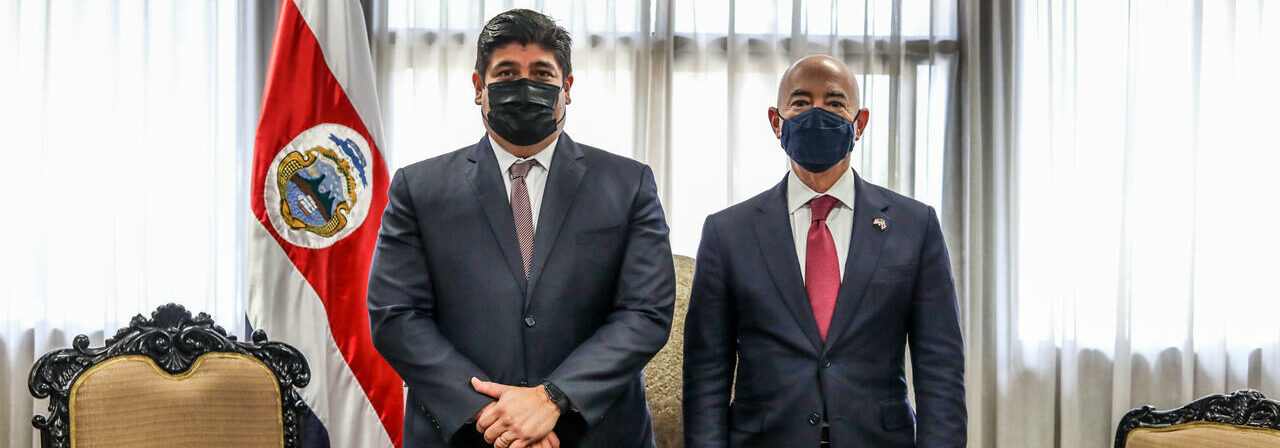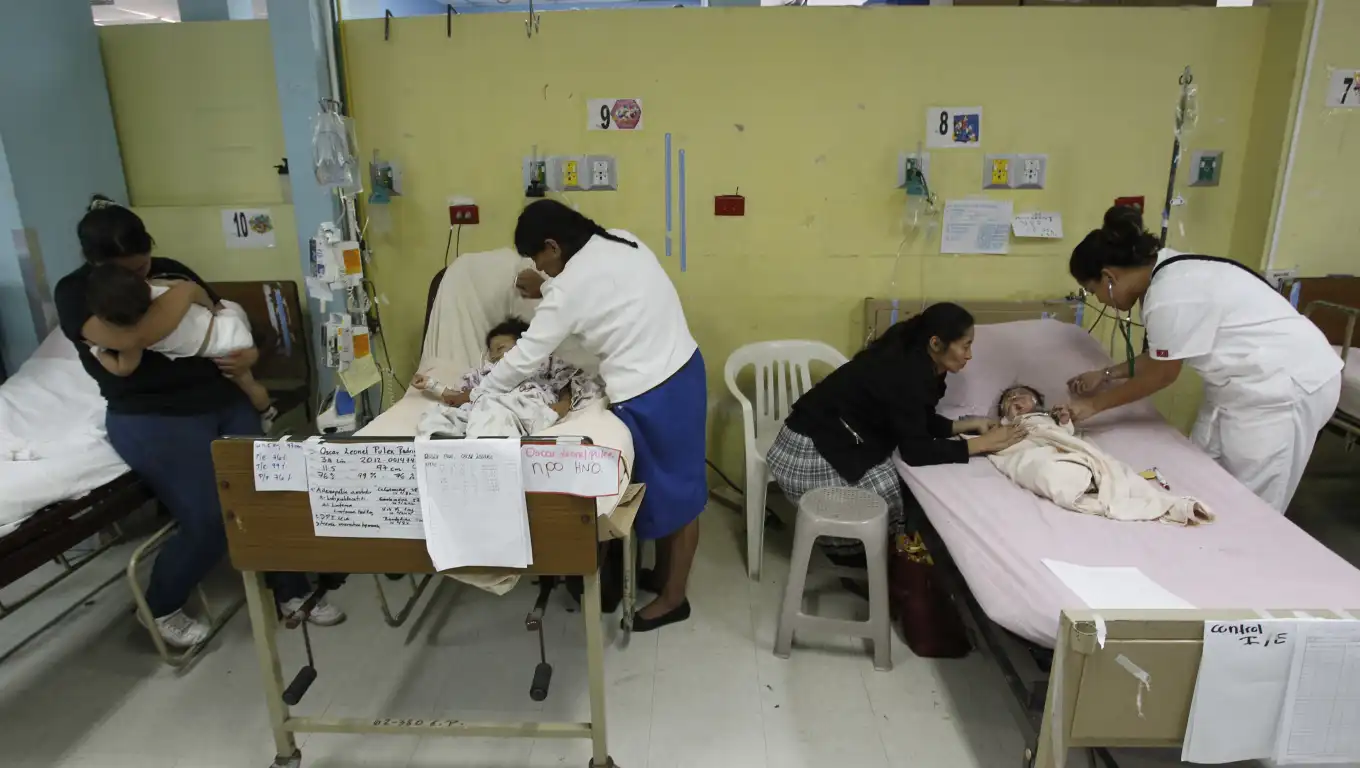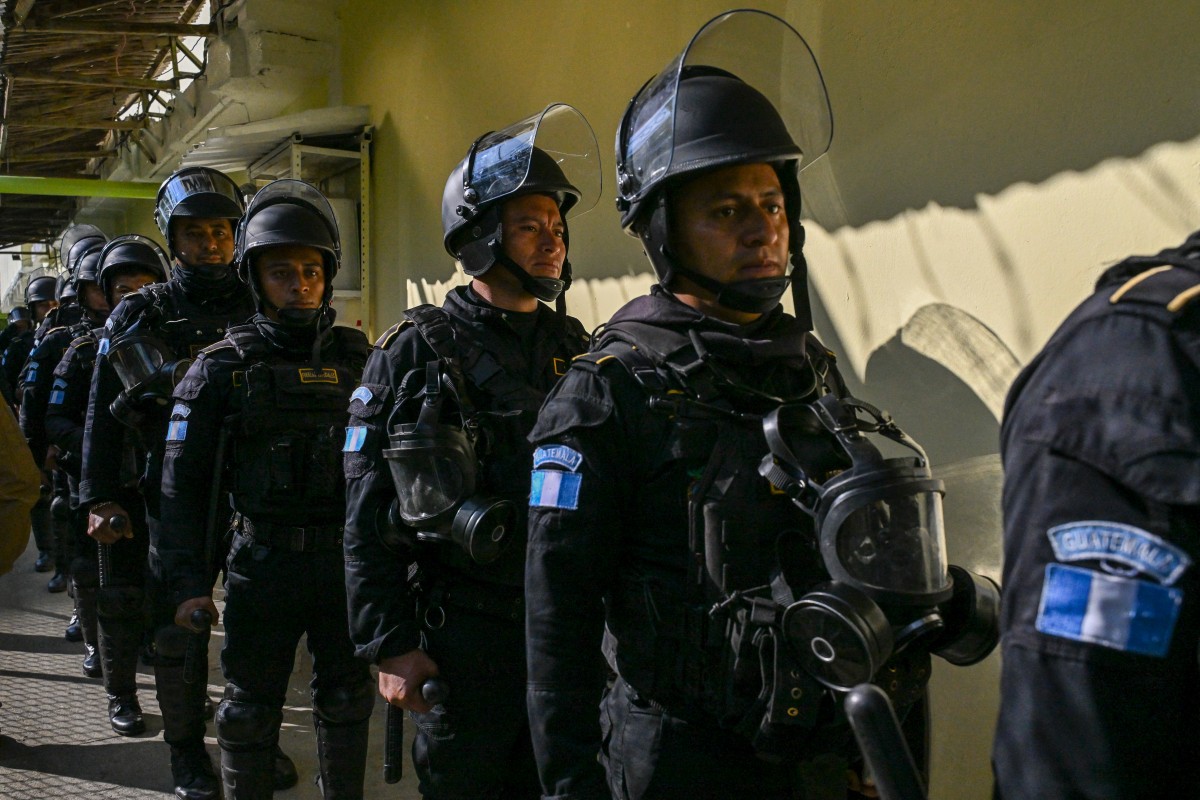Central America
US homeland security chief signs Costa Rica migration deal

AFP
The United States homeland security secretary on Tuesday signed a deal to address migration in Central America during a visit to Costa Rica.
The country is one of the main transit routes for migrants making their way north in the hope of reaching the US, and the American government has tried to deter people without documents from reaching its southern border with Mexico.
According to the Costa Rican government, the agreement seeks to boost the fight against migrant smuggling and human trafficking, while exploring options to “strengthen current programs for the integration of migrants, asylum seekers and refugees.”
Alejandro Mayorkas, the US homeland security secretary, hailed the “historic” agreement — the first of its kind in the region — and spoke of opportunities it would bring to people “to achieve their dreams.”
“We selected Costa Rica as the first partner and friend to sign such an important agreement because of its leadership in the matters that impact the region and, quite frankly, the world,” he said after meeting President Carlos Alvarado.
“This agreement speaks of possibilities. As the president of Costa Rica has addressed and as our president of the United States has addressed, it is all about possibilities and possibilities become realities when we invest.”
Mayorkas arrived in Costa Rica’s capital San Jose after visiting Mexico, where he met with President Andres Manuel Lopez Obrador.
The Mexican authorities said there was a need to invest in Central America and generate greater opportunities that prevent migration.
In recent years, the flow of undocumented migrants has increased, while Washington has tightened its immigration policies.
Since taking office in January 2021, US President Joe Biden has pledged a more humane immigration policy and sought to dismantle a controversial Trump-era border program that denies asylum seekers entry to the United States while their case is reviewed.
Officially called the Migrant Protection Protocols, then-president Donald Trump’s “Remain in Mexico” program saw tens of thousands of non-Mexican asylum seekers — mostly from Central America — sent back over the border pending the outcome of their applications.
According to the United Nations, last year almost a million Mexicans and Central Americans fled their countries due to violence, lack of opportunities, climate change the Covid-19 pandemic.
Central America
Guatemala to Phase Out Longstanding Medical Cooperation Agreement with Cuba

Guatemala’s government announced on Tuesday that it will end this year a cooperation agreement with Cuba that has brought doctors from the Caribbean nation to work in the Central American country.
Guatemala’s Health Ministry told EFE that the program, which has been in place for nearly three decades, will be phased out progressively throughout 2026.
According to the same source, there are currently 412 Cubans in Guatemala under the agreement, including 333 physicians.
Cuban medical brigades assigned to Guatemala have traditionally been deployed to various regions of the country to provide primary health care to local communities.
“The decision follows a technical assessment aimed at strengthening the sustainability of the national workforce and consolidating the public health system’s own capacities,” the Guatemalan ministry said.
Earlier this week, lawmaker Sonia Gutiérrez, from the left-wing Winaq party, warned that the move “could be an inhumane act that threatens the health and lives of the country’s most vulnerable populations,” given the historic importance of Cuban doctors in providing medical care.
For that reason, the legislator summoned Health Ministry authorities to Congress, as permitted by law, to provide further details about the decision.
Former human rights ombudsman Jordán Rodas Andrade also weighed in on social media, recalling that “for 27 years Cuban doctors have been the backbone of health care in Guatemala’s most neglected areas,” and stressing that “ending this agreement is an act of ingratitude that leaves the most vulnerable unprotected.”
President Bernardo Arévalo’s government told EFE that, in order to guarantee continued care, it will implement a gradual replacement plan that includes hiring national personnel.
Central America
Guatemala isolates Barrio 18 leader after attacks that killed 11 police

Guatemalan authorities have placed a leader of the Barrio 18 gang in an isolated cell without الكهرباء or “privileges” after he was accused of triggering a recent wave of violence that left 11 police officers dead, the government said on Sunday.
Members of Barrio 18, which is designated as a “terrorist” organization by both the United States and Guatemala, carried out the killings on January 18 in retaliation for the government’s takeover of three prisons that had been under the control of inmates linked to the group.
In response to the attacks, President Bernardo Arévalo declared a month-long state of siege, arguing that gang members were seeking better conditions in prison or transfers to lower-security facilities.
In a message posted on X alongside photographs, Arévalo announced the isolation of Aldo Dupie, also known as “El Lobo,” one of the gang leaders who allegedly directed the uprisings.
Images released by the government show Dupie inside a small cell with narrow windows, built from metal containers, in a secured area of the Renovación I prison in southern Guatemala — the same facility where the hostage-taking riot took place.
With a shaved head and a stern expression, the gang leader appears alone and in handcuffs, according to the photographs.
Guatemala’s prison system said the “new area,” protected by metal fencing and barbed wire, will house high-risk inmates who will remain without privileges or electricity.
Sports
Shakira ignites El Salvador with near sold-out residency at Mágico González Stadium

The recently renovated Jorge “Mágico” González Stadium is rolling out the red carpet for Colombian superstar Shakira, whose string of concerts has sold out almost entirely, confirming the powerful bond between the artist and Salvadoran fans.
The scale of the experience begins as soon as attendees arrive at the venue. Outside the stadium, organizers have installed several photo spots so concertgoers can capture a souvenir from the major event.
Fans attending the Las Mujeres Ya No Lloran World Tour will witness a top-tier visual production, where technology and robotic lighting effects will shape an atmosphere that shifts dramatically from one segment of the show to another — moving from the intensity of ’90s rock to the festive explosion of urban pop.
Security and crowd management have been top priorities, with a coordinated operation aimed at ensuring smooth entry and exit, allowing spectators to focus solely on enjoying hits that have defined generations.
Beyond the music, the event marks a milestone for the country’s live-entertainment industry, positioning El Salvador as a destination capable of hosting artist residencies once reserved for cities such as Las Vegas or London.
The excitement is already visible across the capital: hotels are at full capacity and local businesses are riding the wave of enthusiasm sparked by the latest songs from the Colombian star.
-

 Central America5 days ago
Central America5 days agoGuatemala isolates Barrio 18 leader after attacks that killed 11 police
-

 International3 days ago
International3 days agoU.S. Health Department says CDC grants no longer match agency priorities
-

 International2 days ago
International2 days agoOver 50 Civil Groups Urge House to Impeach DHS Secretary Kristi Noem
-

 Central America2 days ago
Central America2 days agoGuatemala to Phase Out Longstanding Medical Cooperation Agreement with Cuba
-

 International3 days ago
International3 days agoDespite homicide drop, overall deadly violence remains high in Mexico: study
-

 International3 days ago
International3 days agoICE Arrests Reach 379,000 Under Trump, Testimony Shows Amid Minnesota Shootings
-

 International3 days ago
International3 days agoMEPs Approve Plan That Could Fast-Track Rejection of Some Asylum Claims
-

 International3 days ago
International3 days agoSheinbaum Urges Mexico to ‘Jealously’ Guard Sovereignty at Air Force Anniversary
-

 International3 days ago
International3 days agoJet Fuel Crisis Hits Cuba: Flights Disrupted, Air Canada Cancels Services
-

 International2 days ago
International2 days agoNew York’s New Archbishop Names Óscar Romero as His Favorite Saint
-

 International17 hours ago
International17 hours agoHead-of-state diplomacy key to guiding China–U.S. ties, Beijing says
-

 International3 days ago
International3 days agoMexico Rises Slightly to 141st in Global Corruption Perceptions Index 2025
-

 International17 hours ago
International17 hours agoTrump administration to end special immigration operation in Minnesota
-

 International17 hours ago
International17 hours agoFlorida judge sets 2027 trial in Trump’s $10 billion lawsuit against BBC
-

 International2 days ago
International2 days agoExclusive Tucson Neighborhood Shaken by Disappearance of Savannah Guthrie’s Mother
-

 International3 days ago
International3 days agoChile Unveils Latam-GPT to Give Latin America Its Own AI Model


























